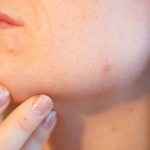“Hyperpigmentation” can seem like a big scary, medical term. Breaking it down, “hyper” usually means excess, while “pigment” means the natural coloring. Together it means an excessive amount of the stuff that gives your skin its natural color. Not so scary now, right?
Hyperpigmentation is an extremely common and usually harmless skin condition where some areas of skin appear darker than others. It occurs when your skin produces too much melanin, the dark pigment responsible for giving humans different skin colors.
What is pigmentation?
Melanin is a natural skin pigment or coloring. Your skin, hair and eye color are all determined by the amount of melanin you have. Your body produces melanin, and your genes determine the amount it makes. Like many things the body produces, some produce more melanin, and some produce less, which accounts for the varieties of skin we see every day.
If your body makes more melanin, your hair, skin and the color of your eyes are darker. If your body makes less melanin, then your hair, skin and eyes are lighter.
What is hyperpigmentation?
Hyperpigmentation happens when your body processes too much melanin, usually in spots or patches of skin. You may see normal hyperpigmentation on your body as freckles. In most cases, freckles are harmless as they come from a completely normal overproduction of melanin.
You may also see what are called age spots on your skin, another kind of hyperpigmentation. They can also be called “liver spots,” but they have nothing at all to do with your liver. These spots are small, dark splotches on the skin. Even though this kind of hyperpigmentation is more common in older adults, young folks can get them too if they get a lot of sun. Avoid age spots later in life by avoiding sun exposure and using sunscreen.
Hyperpigmentation is usually normal
Hyperpigmentation is entirely normal and typically nothing to worry about. It is most commonly caused by sun exposure. Pregnancy and hormone changes in women can also often lead to hyperpigmentation, commonly referred to as the “pregnancy mask.” When you get a nasty cut and a scar forms, that is a form of hyperpigmentation. You can get it from a bad burn (and a bad sunburn!) or an allergy like hives or chickenpox. Some medications and diseases can also affect your skin.
Sometimes these patches may have an underlying medical cause and you need to get it checked out.
When to talk to a dermatologist
A dermatologist is a doctor with specialized training in skin and various skin conditions. They can offer you the best diagnosis and treatment options for your specific skin concern. A yearly skin exam will help to keep your skin healthy. If you notice any abnormalities in your skin, such as rapid or extreme darkening, you should make an appointment with your dermatologist. The good news is, many skin conditions are minor and are easily treatable.
A range of treatment options
There are many options to treat hyperpigmentation if treatment is necessary. Here are a few options to discuss with your dermatologist:
- Lightening creams, available over the counter (OTC) and in prescription strength help reduce hyperpigmentation. They are usually applied once or twice a day and lighten skin over time.
- Exfoliating lotions work by removing the top layer of your skin (the epidermis) and replace the old skin with new.
- Retinoids are a treatment usually in a lotion or a cream, made from vitamin A and mainly used to smooth the skin.
- Chemical peels, which use specially formulated acids to treat the desired area of skin. They reduce hyperpigmentation by removing the skin.
- Laser treatments use a low-power laser beam to focus on and target specific areas of skin.
- Microdermabrasion, a procedure where your dermatologist uses a specially designed handheld tool to remove the outermost layer of skin (the epidermis). Dermabrasion is a similar technique, but it goes a little deeper into your skin.
Help for hyperpigmentation
Each of these treatments is intended for a specific case and specific results. There is no “one-size-fits-all” treatment option. Your dermatologist is your best resource to discuss your skin concerns and help you identify the best course of treatment.
No matter which treatment you choose, it is crucial to protect your skin from sun damage and increased hyperpigmentation. Wear sunscreen while spending time outdoors. Use a good moisturizer and reapply both throughout the day.
To learn more about preventing hyperpigmentation and schedule your yearly skin exam, contact the expert dermatologists at Columbia Skin Clinic today.






